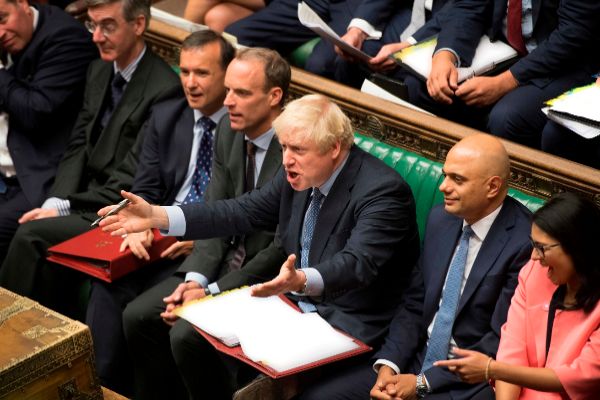- Elections.Boris Johnson proposes early elections in the United Kingdom on October 15
- Brexit: Labor will not support Boris Johnson early elections
Boris Johnson failed in his attempt to call early elections to leave the 'impasse' of Brexit. The 'premier' did not get the necessary support of two thirds in the House of Commons to dissolve the Parliament and set the appointment with the polls for October 15 . 298 deputies voted in favor of 'no' and 56 against.
The Labor opposition boycotted Johnson's proposal warning that the priority at this time is to "implement" the law to veto Brexit without agreement, passed on Wednesday by 29 votes (but still pending processing in the House of Lords). Labor seems open to an election date as long as the government agrees to request a three-month extension for Brexit and the threat of 'no deal' is finally conjured.
After six weeks on Downing Street, Boris Johnson has remained in a very compromised position, after reaping three parliamentary defeats in two days and facing the insurrection in his own ranks. The conservative leader reiterated his desire to complete Brexit on October 31 and condemned Parliament's decision to support "the law of surrender" of Labor leader Jeremy Corbyn.
Johnson was harshly criticized in the meantime for his decision to expel 21 "rebel" deputies from the party; among them Churchill's grandson, Nicholas Soames, who sang an emotional farewell speech in Parliament that struck the conscience of the 'tories'. The former Secretary of the Treasury, Philip Hammond, also voted again for the second consecutive day against his leader, whom he accused of being carrying out "a mass purge . "
The 'premier' received, yes, the distant support of the American president, Donald Trump, who decided to give him a cape: "He is my friend, he will get it and there is no doubt that he will do it. Boris knows how to win, do not you worry about him. "
In an intervention before the 1922 Parliamentary Committee, the conservative leader tried to placate the growing discomfort among the 'tories' by ensuring that there will be elections and that the United Kingdom will leave the EU on October 31. Johnson was criticized however for expelling the 'rebel' tories and was questioned very directly for the role of his adviser and former Vote Leave strategist, Dominic Cummings, in his inflexible attitude to Brexit.
Throughout the afternoon, the 'premier' conceded the second and third defeat on account of the law to veto the exit of the EU without an agreement (finally approved by 327 votes in favor and 299 against). Parliament thus endorsed the text promoted by Labor Hilary Benn that blocks the 'no deal' and forces the Government to request a three-month extension of Brexit (until January 2020) if an agreement with Brussels is not reached before 19 October. The law leaves the doors open to future extensions of Article 50 of the Lisbon Treaty and provides for parliamentary control over the progress of negotiations with Brussels.
"Passing this law is not enough," Hilary Benn warned. "What is needed is to be put into effect. In other words, we must ensure that the extension of Article 50 occurs, or else we run the risk of elections that result in an EU exit without an agreement. " .
"Passing this law is not enough"
The Labor Party again showed signs of an internal division towards the possibility of early elections. Early Wednesday, Labor spokesman for Brexit, Keir Starmer, anticipated the vote against Johnson's proposal to hold new general elections (the third in four years) on October 15.
"Holding elections now is a trap," Starmer said. "Our priority is to ensure that there will be no exit from the EU without an agreement." The Labor deputy also attacked the personal adviser of Boris Johnson, whom he accused of devising a plan to suspend Parliament, advance the elections and corner the Labor Party. " What Johnson and Cummings are doing is destroying their own party ," Starmer warned. "This is not going to end well."
Hours later, a spokesman for Corbyn clarified, however, Starmer's statements: "We want to have a general election as soon as possible to leave the country facing (...) But the law passed by Parliament It must first pass all the procedures, including real consent, and once we have the confidence that the 'no agreement' is off the table by October 31, then we will approve elections. "
Labor fears that Johnson may benefit from the pull of popularity right now. The latest YouGov poll for 'The Times' gives the Conservative Party 33% of voting intention, compared to 22% of the Labor Party, 21% for Liberal Democrats and 12% for the Nigel Farage Brexit Party, which has been offered in advance to Johnson for a hypothetical post-election pact to push Brexit "to the braves."
In a tough exchange in Parliament, hours before the vote, Boris Johnson accused Jeremy Corbyn of being "scared" at the prospect of an early election . "What do you want and when do you want it? No one knows," the 'premier' snapped at the opposition leader. "
"What are you hiding?" Replied Corbyn, who demanded the publication of internal reports on the serious impact that 'no deal' could have on the supply of medicines and food. "This prime minister does not have a plan to negotiate, has no authority and has no majority. People have reason to fear him for his incompetence."
According to the criteria of The Trust Project
Know more- Boris johnson
- UK
- Donald Trump
- Brexit
United Kingdom The British Parliament tries to block the "extreme" Brexit of Boris Johnson
BrexitDonald Trump says Boris Johnson is "great" for the UK after suspending Parliament
European Union Emmanuel Macron warns Boris Johnson that there is no time for "a new agreement"

